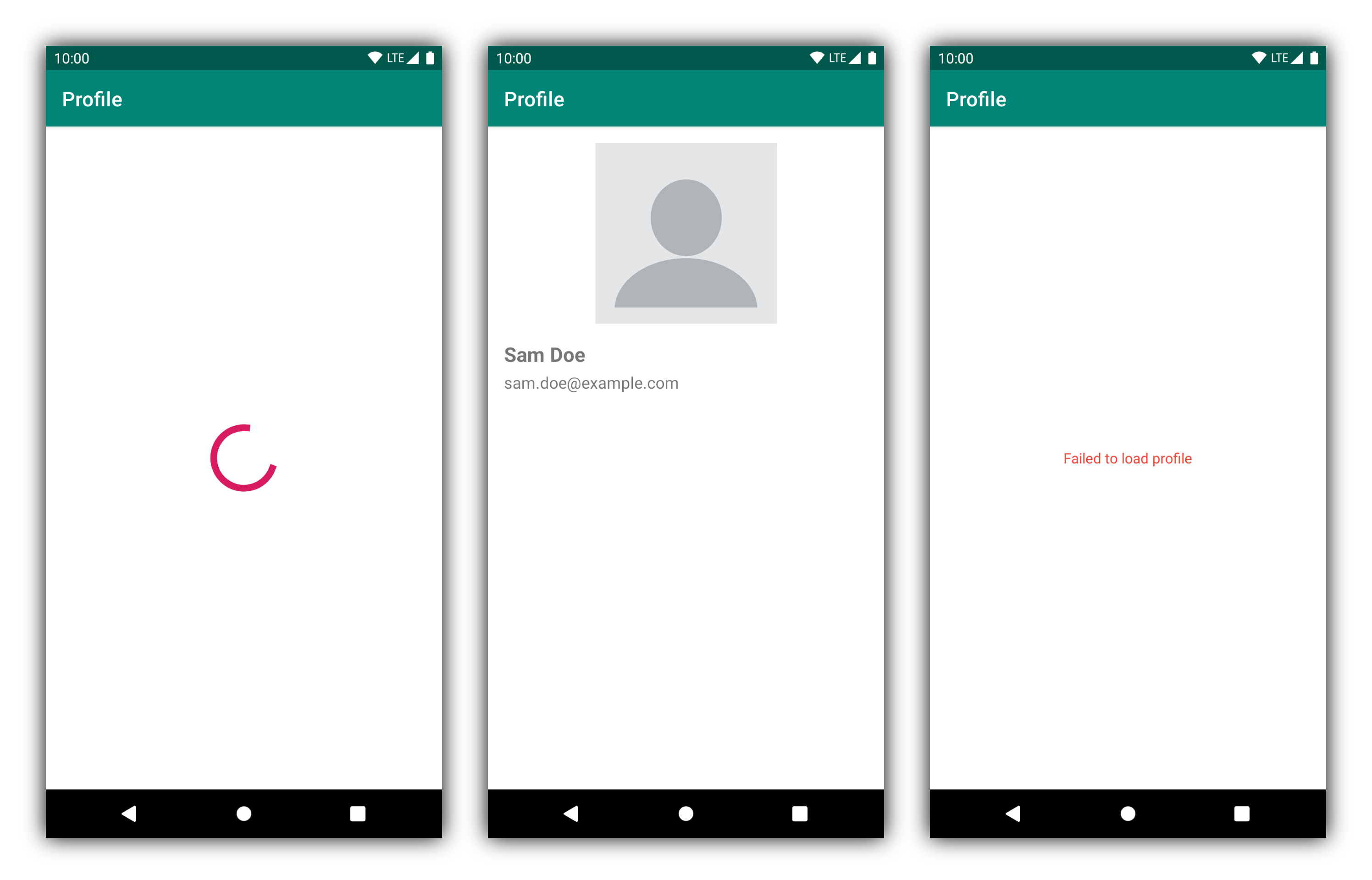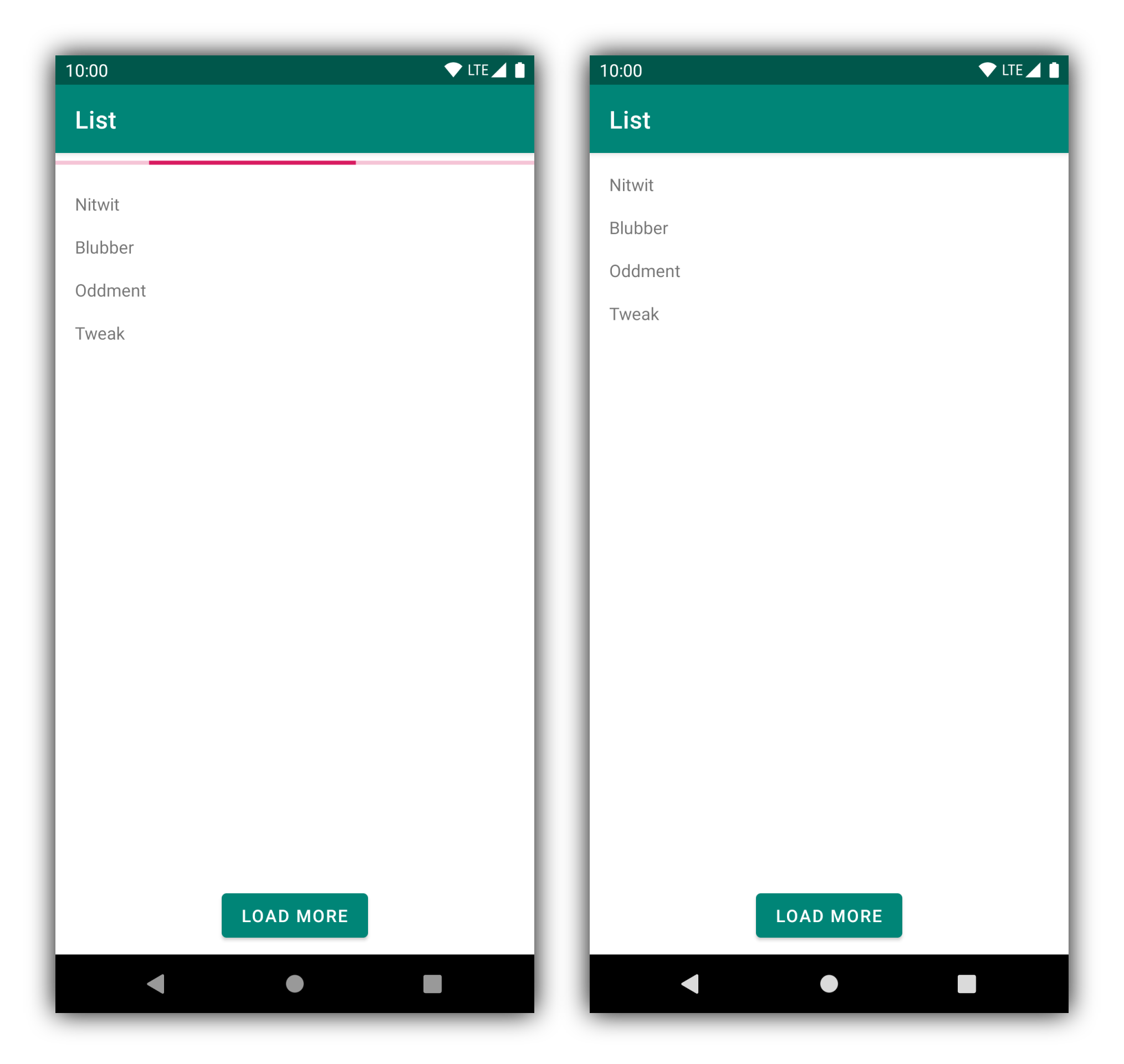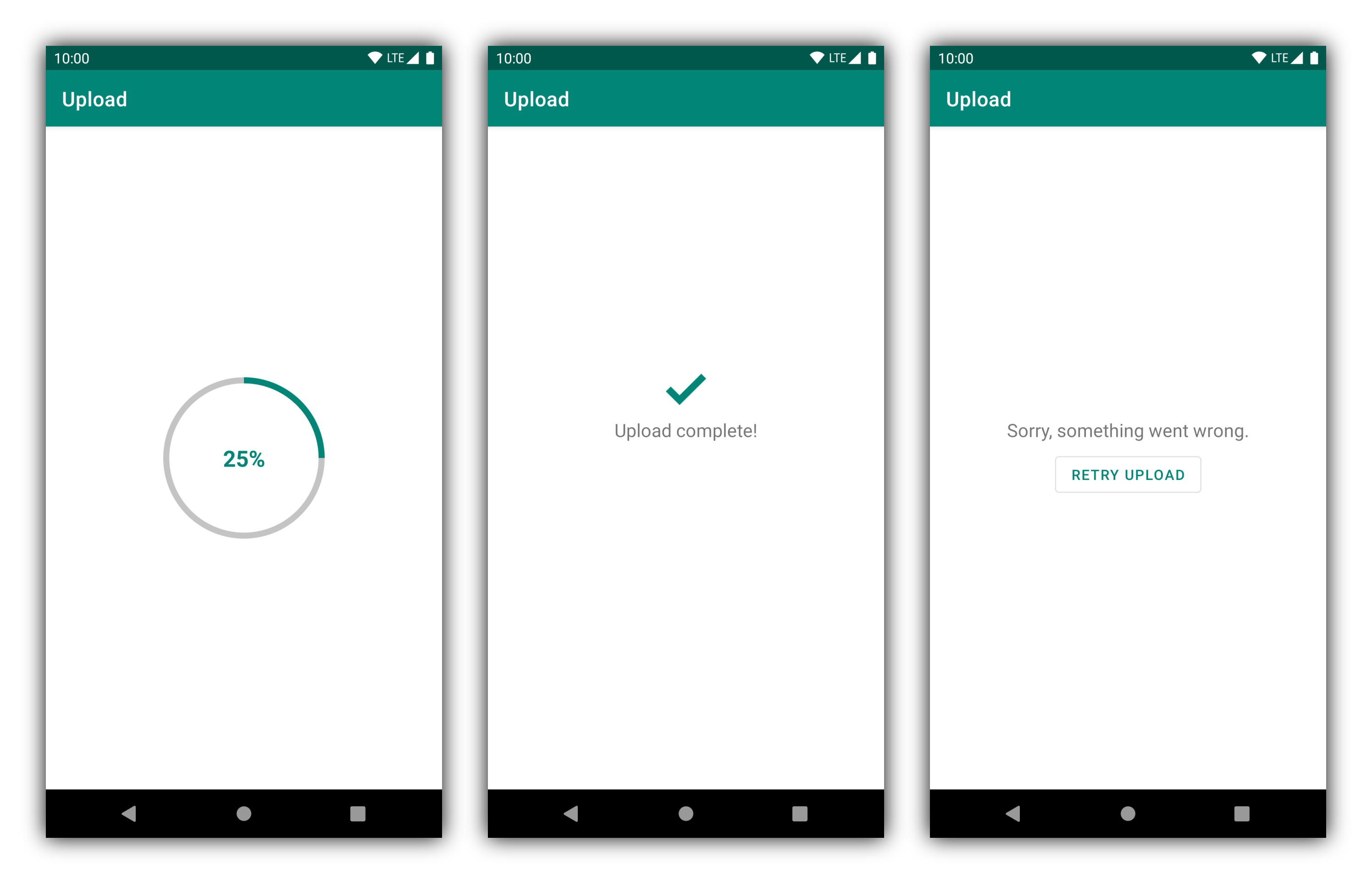https://androidweekly.net/issues/issue-416
Designing and Working with Single View States on Android
https://zsmb.co/designing-and-working-with-single-view-states-on-android/
ViewState是用于标识View状态的对象,通过ViewState,可以将View的显示逻辑与控制逻辑抽离。在MVI、MVVM等设计模式中都可以看到它的身影。
用例:加载联系人信息
这个页面有三个状态:Loading、Loaded、Error。
loading_loaded_error.png
共用data类
- 优点:类数目最少
- 缺点:会出现诸如
errored=true, loading=true的异常状态
1
2
3
4
5
6
| data class ProfileViewState(
val errored: Boolean = false,
val loading: Boolean = false,
val name: String? = null,
val email: String? = null
)
|
Sealed classes(密封类)
1
2
3
4
5
6
7
8
9
10
| sealed class ProfileViewState
object Loading : ProfileViewState()
object Error : ProfileViewState()
data class ProfileLoaded(
val name: String,
val email: String
) : ProfileViewState()
|
View类里面的绘制方法如下,注意exhaustive扩展函数能够在我们的when语句漏写某个分支时,在编译过程就抛出异常。
1
2
3
4
5
6
7
8
9
10
11
12
13
14
15
| private fun render(viewState: ProfileViewState) {
when (viewState) {
Loading -> {
viewFlipper.displayedChild = Flipper.LOADING
}
Error -> {
viewFlipper.displayedChild = Flipper.ERROR
}
is ProfileLoaded -> {
viewFlipper.displayedChild = Flipper.CONTENT
profileNameText.text = viewState.name
profileEmailText.text = viewState.email
}
}.exhaustive
}
|
ViewFlipper可以用来展示多个Children中的一个:
1
2
3
4
5
6
7
8
9
| class ProfileFragment : Fragment() {
private object Flipper {
const val LOADING = 0
const val CONTENT = 1
const val ERROR = 2
}
}
|
布局文件:
1
2
3
4
5
6
7
8
9
10
| <ViewFlipper
android:id="@+id/viewFlipper"
android:layout_width="match_parent"
android:layout_height="match_parent">
<include layout="@layout/profile_loading" />
<include layout="@layout/profile_content" />
<include layout="@layout/profile_error" />
</ViewFlipper>
|
共享数据,独立状态
如列表下滑加载更多,已经获取到的item仍然显示在界面上。
load_more.png
使用data class来做ViewState。
1
2
3
4
5
6
7
8
9
10
11
12
13
14
15
16
17
18
19
20
21
|
data class ListViewState(
val isLoading: Boolean,
val items: List<String>
)
private fun render(viewState: ListViewState) {
progressBar.isVisible = viewState.isLoading
wordAdapter.submitList(viewState.items)
}
sealed class ListViewState
object Error: ListViewState()
data class ListReady(
val isLoading: Boolean,
val items: List<String>
): ListViewState()
|
更加复杂的UI
对于包含更多元素的UI,在when语句之前要将共用逻辑抽出,以简化when代码块。
upload_sample.png
复杂写法,每个分支里处理所有UI元素,容易遗漏,维护困难:
1
2
3
4
5
6
7
8
9
10
11
12
13
14
15
16
17
18
19
20
21
22
23
24
25
26
27
28
29
30
31
32
33
34
35
36
| private fun render(viewState: UploadViewState) {
when (viewState) {
Initial -> {
uploadProgressText.isVisible = false
progressBar.isVisible = false
uploadDoneIcon.isVisible = false
uploadStatusText.isVisible = false
retryUploadButton.isVisible = false
}
is UploadInProgress -> {
uploadProgressText.isVisible = true
progressBar.isVisible = true
uploadDoneIcon.isVisible = false
uploadStatusText.isVisible = false
retryUploadButton.isVisible = false
progressBar.setProgressWithAnimation(viewState.percentage.toFloat())
uploadProgressText.text = "${viewState.percentage}%"
}
UploadFailed -> {
uploadProgressText.isVisible = false
progressBar.isVisible = false
uploadDoneIcon.isVisible = false
uploadStatusText.isVisible = true
uploadStatusText.text = "Sorry, something went wrong."
retryUploadButton.isVisible = true
}
UploadSuccess -> {
uploadProgressText.isVisible = false
progressBar.isVisible = false
uploadDoneIcon.isVisible = true
uploadStatusText.isVisible = true
uploadStatusText.text = "Upload complete!"
retryUploadButton.isVisible = false
}
}.exhaustive
}
|
简化写法,提取各个状态专有UI元素,优先处理;when语句只处理共享UI元素:
1
2
3
4
5
6
7
8
9
10
11
12
13
14
15
16
17
18
19
20
21
22
23
24
| private fun render(viewState: UploadViewState) {
uploadProgressText.isVisible = viewState is UploadInProgress
progressBar.isVisible = viewState is UploadInProgress
retryUploadButton.isVisible = viewState is UploadFailed
uploadDoneIcon.isVisible = viewState is UploadSuccess
uploadStatusText.isVisible =
viewState is UploadFailed || viewState is UploadSuccess
when (viewState) {
Initial -> {
}
is UploadInProgress -> {
progressBar.setProgressWithAnimation(viewState.percentage.toFloat())
uploadProgressText.text = "${viewState.percentage.toInt()}%"
}
UploadFailed -> {
uploadStatusText.text = "Sorry, something went wrong."
}
UploadSuccess -> {
uploadStatusText.text = "Upload complete!"
}
}.exhaustive
}
|
使用 ConstraintLayout Groups 简化
一个Group可以同时控制多个View的可见性。
1
2
3
4
5
| <androidx.constraintlayout.widget.Group
android:id="@+id/errorViews"
android:layout_width="wrap_content"
android:layout_height="wrap_content"
app:constraint_referenced_ids="errorTitle, errorIcon, errorMessage" />
|
Easy Android Scopes
https://ryanharter.com/blog/2020/03/easy-android-scopes/
介绍Activity、Fragment发生Configuration Changed事件时的数据保存方法,类似AndroidX中的ViewModel。
作者实现了自己的一套Scoped Delegate方案。
Jetpack ViewModel and string resources
https://www.rockandnull.com/android-viewmodel-resources/
在使用ViewModel时,作者试图将ViewModel实现与Android解耦,以便ViewModel可以无缝迁移到其它平台(如iOS、Web)。文中提供了两种思路。
方案一:使用ResourceId
将资源id作为LiveData进行发送,而非字符串本身。
1
2
3
4
5
6
7
8
9
10
|
val errorMessageLiveData = MutableLiveData<Int>()
[...]
errorMessageLiveData.value = R.string.error_message_1
errorMessageLiveData.observe(this, Observer {
Toast.makeText(context, getString(it), Toast.LENGTH_LONG).show()
}
)
|
方案二:使用资源工厂类(Resources Helper)
该类用于抽象不同平台的资源获取方式。
1
2
3
4
5
| class ResourcesHelper(private val applicationContext: Context) {
val errorMessage
get() = applicationContext.getString(R.string.error_message)
}
|
将该类注入(inject)到ViewModel中,可以使其独立于不同平台实现,并且能够进行mock/fake。
在ViewModel中使用Context
使用AndroidViewModel代替ViewModel。
1
2
3
4
| class MyViewModel(private val application: Application) : AndroidViewModel(application) {
val errorMessage
get() = application.resources.getString(R.string.some_string)
}
|
这种写法有一个问题是,用户切换语言无法生效。以及在测试时必须人工提供一个Context对象。
##
最后更新时间:
本文系作者原创,如转载请注明出处。欢迎留言讨论,或通过邮件进行沟通~


